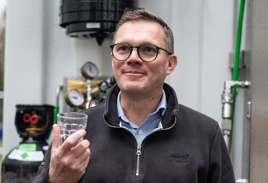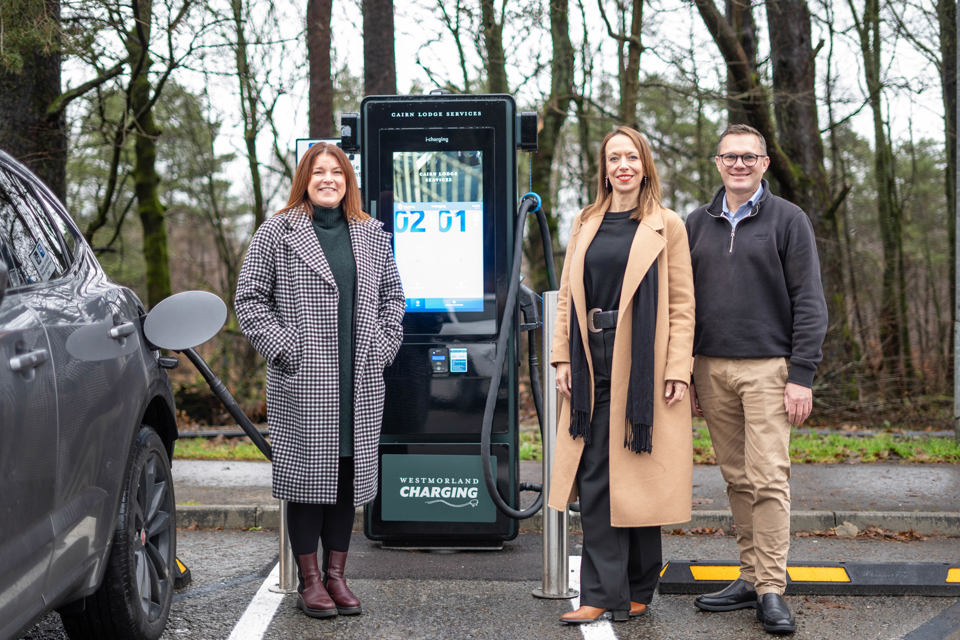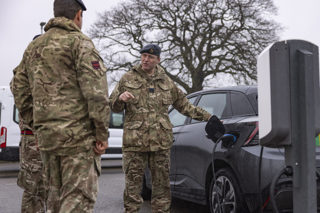GeoPura is expecting to install 2,500 hydrogen power units (HPUs) that can be used to implement off-grid charging infrastructure in areas that are struggling with planning and grid capacity.
The renewable energy specialist already has 80 HPUs in use and is looking to rapidly scale the business over the next five years.
The HPUs work like a diesel generator, but run on zero emission “green hydrogen” fuel cell technology that is generated using renewable energy sources like wind and solar. The only emission from the fuel is water.
Public sector fleets like the Ministry of Defence (MoD) are already using HPUs to charge their EVs, while Balfour Beatty is using them on site locations to provide power for facilities at construction sites, as well as EV charging points.
Cairn Lodge Services on the M74 in Lanarkshire, part of the Westmorland Family, has also implemented HPUs for its EV chargers.
Each HPU delivers 250kVA of standard three-phase, 400V critical electrical power backed up by an integral 216kWh battery system and multiple units can be combined, to scale to the needs of the installation.
 Matt Barney, GeoPura chief hydrogen business officer (pictured), told Fleet News that the HPUs were initially designed to support EV charging infrastructure, but the use cases have since expanded to things like construction, film and TV, as well as outdoor events.
Matt Barney, GeoPura chief hydrogen business officer (pictured), told Fleet News that the HPUs were initially designed to support EV charging infrastructure, but the use cases have since expanded to things like construction, film and TV, as well as outdoor events.
Barney said: “The EV charging support is still a core part of the business.
“We’re working directly with corporate fleets, public sector fleets and motorway service stations.
“The idea is to offer a zero emission solution to put charging infrastructure in place in locations where increasing grid capacity is either too expensive or will take too long to implement.”
The National Audit Office (NAO) recently released a report that showed the local authorities are struggling to implement their charging infrastructure plans due to delays with planning and issues with grid capacity.
The HPUs can support different charging applications like 7kw destination charging for workplace charging our overnight depots, as well as 150kw rapid chargers if needed.
The MOD is trialling the HPUs at five locations, including RAF Leeming, HMNB Devonport, Merville Barracks Colchester, HMS Excellent Portsmouth and RAF Northolt.
Barney said: “The MoD fleet has been a great advocate for the HPUs.
“They’re looking at all different fuel solutions, but they’re just like any other fleet in terms of looking to decarbonise and switch to EVs.
“The HPUs have given them a solution when they can’t get the grid power they need quickly enough and it means their EVs can be charged on site, rather than on the public network.”
Barney said the cost model GeoPura has put in place means the charge points can be offered at similar prices to a service station rapid charger, at around 70p/kWh.
While he acknowledged that this is much higher than the prices that can be achieved when using a home charger, it still offers a solution that is “reliable and convenient” that can match what drivers are paying on public networks.
GeoPura has been making its own hydrogen in partnership with Siemens Energy for the last three years.
It’s working on expanding to the point where it will have more localised distribution to cut down delivery miles of the green hydrogen by tanker.
The hydrogen is produced using renewable energy which powers a water electrolysis process that creates the liquid hydrogen fuel to be transported to the HPUs to run on.
Barney said the HPUs have no moving parts and require less maintenance as a result.
Each one comes with an integrated 250kWh battery storage that can provide “hours of back-up” power should a hydrogen supply be interrupted at any stage.
Siemens Energy and GeoPura are actively looking for renewable energy producers who want to maximise their renewable energy production and generate green hydrogen at their sites.
Barney added: “We have seen some catastrophic cases where diesel generators have been used to power EVs, which isn’t what we want to see on the road to net zero.
“We have a solution that means fleet managers and charge point operators can scale up their EV charging infrastructure without having to wait.”





















Login to comment
Comments
No comments have been made yet.